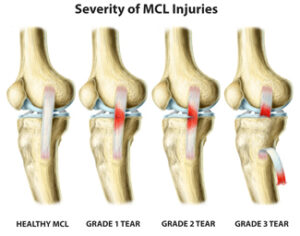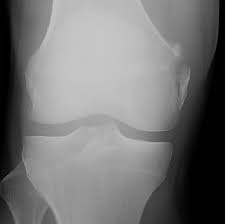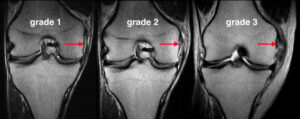Understanding Medial Collateral Ligament (mcl) Knee Injuries
HOW DOES A MCL (MEDIAL COLLATERAL LIGAMENT) TEAR OR STRAIN FEEL?
An injury to your MCL will feel very sharp and painful along the inside or medial aspect of your knee. Since the MCL is about 10 cm long your knee can hurt above and below the knee joint.
An injury to the MCL ligament will be associated with swelling, stiffness, and pain. There will also be mild to severe difficulty with putting weight down on the foot and or twisting or turning depending on the severity of the tear.
As the acute symptoms improve, patients will also notice instability in their knee when they do activities that involved pushing off, twisting, or cutting.
HOW IS A MCL (MEDIAL COLLATERAL LIGAMENT) TEAR OR STRAIN DIAGNOSED?
The term “tear” and “sprain” are synonymous and both mean a tearing of the ligament tissue. The amount of ligament fibers or tissue that is torn indicates the severity of the injury.

Ligament injuries are graded in terms of severity:
- Grade l : Mild ligament tear
- Grade 2 : Moderate ligament tear
- Grade 3 : Severe (Ruptured) ligament tear
There are two well know clinical tests to accurately diagnoses an MCL tear. An isolated MCL tear will be positive for instability and pain when the physical therapists flexes the knee to 30° and applies medial, valgus or inward pressure on the knee.
This test is also performed with the knee straight so assess an MCL tear as well as instability and injury to the ACL.
X-rays are important to perform because most MCL injuries occur with force and sometimes the ligament can pull a piece of bone off causing an avulsion injury.

MRI imaging is an excellent diagnostic tool to determine the location of the MCL tear as well as the severity. MRI imaging of knee injuries can also be important to rule out injuries to other knee structures such as the cartilage or meniscus.

HOW CAN A PHYSICAL THERAPIST HELP A MCL (MEDIAL COLLATERAL LIGAMENT) TEAR OR STRAIN?
Physical Therapist have long been helpful and successful in getting a faster and more complete remedy for their MCL injury. Often times patients will come to the clinic in a brace and partial weight bearing. It is a physical Therapist’s training and experience that help restore motion and regaining strength will protecting the injured tissue. We are expert at analyzing moment and restoring your function so you can get back to your preferred sport or activity in the shortest period of time.
HOW LONG DOES IT TAKE FOR A MCL (MEDIAL COLLATERAL LIGAMENT) TEAR OR STRAIN TO HEAL?
Depending on the severity of the injury most grade II MCL tears take 6-8 weeks to heel. Depending on a patient’s goals and severity of injury the range is 10 days to 4 months with severe ligament damage and surgery.
CAN A MCL (MEDIAL COLLATERAL LIGAMENT) TEAR OR STRAIN BE PREVENTED?
No injury can be completely prevented but there are ways to reduce the chances and severity of MCL injuries. Maintaining proper strength, alignment, balance and flexibility are helpful in protecting the knee. Prophylactic bracing has also been shown to reduce the severity of MCL injuries.
PHYSICAL THERAPY TREATMENT FOR MEDIAL COLLATERAL LIGAMENT (MCL) TEAR
Westlake Village, Los Angeles, Encino and Simi Valley, California patients that have experienced an MCL injury are encouraged to contact the Doctors at Athletic Physical Therapy for an orthopedic examination. Our Sports Physical Therapists are knee specialist and highly experienced at treating knee injuries, including an MCL tear. Many times surgery is not indicated and with proper physical therapy treatment MCL injuries can be fully rehabilitated.
For additional information on the medial collateral ligament, or for more resources on an MCL injury or MCL tear, please contact the specialists at Athletic Physical Therapy for sports and orthopedic knee treatments with offices located in Westlake Village, Los Angeles, Encino, and Simi Valley California communities.